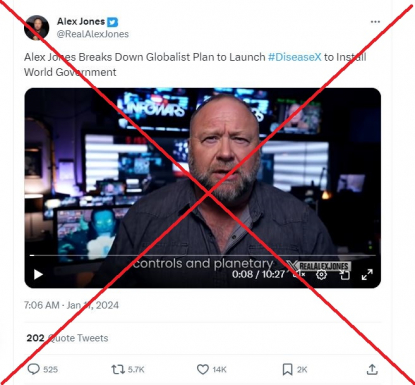WEF ‘Disease X’ session fans pandemic conspiracy theories
Copyright © AFP 2017-2024. All rights reserved.
The World Economic Forum (WEF) held a panel in January 2024 on preparing for a hypothetical future pandemic dubbed “Disease X,” which social media posts claim is evidence of a plot to create a global health catastrophe — repeating debunked Covid-19 conspiracy theories. This is false; the session included a dialogue on mitigating potential risks, and experts say these efforts can help limit the impact of new outbreaks.
“Disease X is coming. But it isn’t some chaotic pandemic we must manage. It is a genocidal kill weapon agreed upon by the worst members of humanity,” says InfoWars founder Alex Jones — who made millions by spreading conspiracy theories about mass shootings and Covid-19 — in a January 17, 2024 post on X, formerly Twitter.
The narrative also spread on Instagram, where one post published the same day says: “Globalists have no problem releasing another bio-weapon for ultimate power.”
Some suggest the non-governmental WEF, a frequent misinformation target, was attempting to create panic to press for ratification of a World Health Organization (WHO) cooperation agreement, another subject of conspiracy theories.
Others claim the session was linked to the 2024 US election, saying: “Election season means it’s time to ramp up the next big scare.”
 Screenshot of an X post taken January 18, 2024
Screenshot of an X post taken January 18, 2024 Screenshot of an Instagram post taken January 18, 2024
Screenshot of an Instagram post taken January 18, 2024
The allegations spread elsewhere on X, blogs, Facebook, TikTok and Rumble, some citing a 2018 post from the WEF as proof of a planned pandemic. Similar claims circulated in Dutch.
But there is no evidence of an effort at the annual WEF meeting in Davos, Switzerland to create or deploy a new virus.
Many of the posts recirculate conspiracy theories that Covid-19 was staged — an assertion that AFP and other fact-checking outlets have repeatedly debunked. AFP also debunked claims about Disease X in French in 2023.
The January 17 WEF panel (archived here), streamed live on YouTube, featured comments from WHO Director-General Tedros Adhanom Ghebreyesus and other health experts.
Ghebreyesus said Disease X is a “placeholder” for a disease that may arrive in the future, and that he did not believe preparation would create panic.
“It’s better actually to anticipate something that may happen … and prepare for it,” he said.
[embedded content]
Queried about the panel, a WEF spokesperson said in a January 19 email: “The session was designed to address the need for improving access and resilience in healthcare systems and enabling public-private collaboration to ensure the wellbeing of all individuals and mitigate risks, including healthcare workforce shortages.”
Other experts told AFP this type of preparation is indeed useful in the event of a new outbreak.
“With the end of the pandemic we’ve lost some momentum, so the WEF discussion is keeping this going, and hopefully we can have continued financial support for research,” said Thomas Russo, head of infectious diseases at the University at Buffalo School of Medicine, on January 17.
He pointed to Covid-19 vaccines, which “were developed within a year but were based on studies ongoing for a decade.”
Tara Kirk Sell, a professor and health security researcher at the Johns Hopkins Bloomberg School of Public Health — who led an October 2019 exercise called Event 201, which spawned similar misinformation — agreed.
“The pandemic preparedness community creates realistic exercises and planning to try to improve our ability to respond to future pandemics,” Sell said in a January 17 email.
“Think about it like a fire drill. Doing a fire drill doesn’t mean that there is a plan to set a fire — it’s so that people practice and know how best to respond in case one happens.”
David Brett-Major, an epidemiologist at the University of Nebraska’s Global Center for Health Security who previously worked with the WHO on health policy prioritization, said the global agency’s focus was on prevention and response to emerging pathogens.
In a January 18 email, Brett-Major said the discussion around Disease X “was a way to talk about risk management steps that one might be able to undertake regardless of what the pathogen might be, X as a variable.”
It was also “a way to acknowledge that we may be surprised by a pathogen that we had not thought about yet … Disease X referred to thinking broadly about preparedness, response, and recovery so that all of us are safer and more effective, not pigeon-holing thinking about those risks that we already know about.”
More of AFP’s reporting on pandemic misinformation is available here.
January 19, 2024 This article was updated to add a comment from WEF.
This article has been archived for your research. The original version from AFP Factcheck can be found here.

